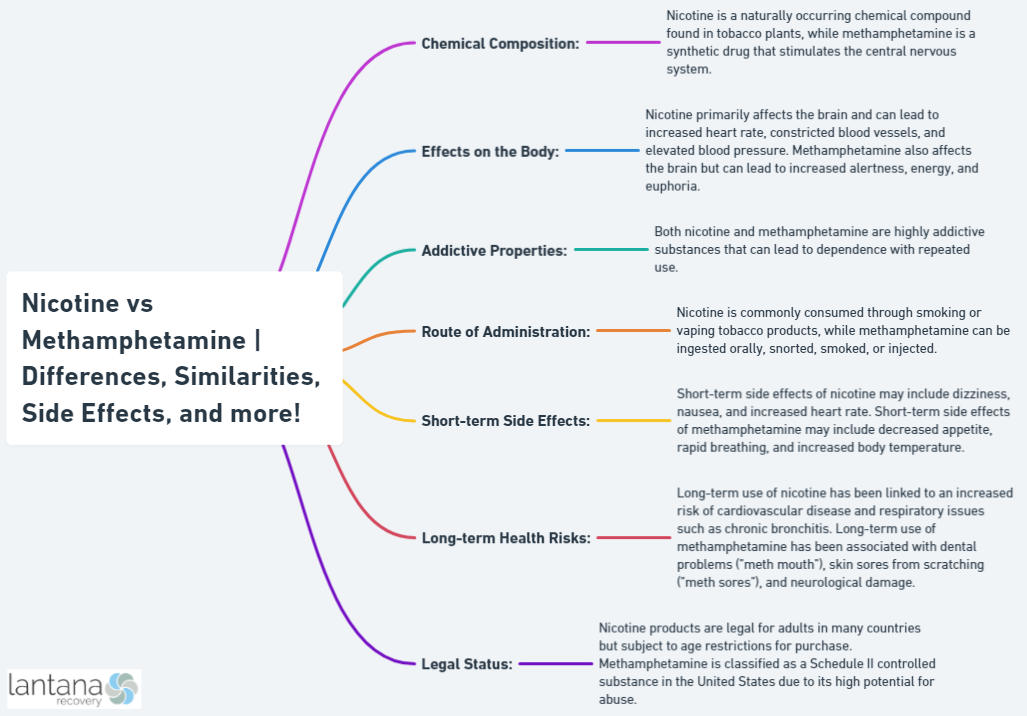Nicotine and methamphetamine are two powerful stimulants that have been used for decades. Both of these drugs have a range of effects on the human body and can be used for a variety of reasons, but the risks associated with each drug can be serious and even fatal. This article will explore the differences between nicotine and methamphetamine, their similarities, potential side effects, and more.
What is Nicotine?
Nicotine is a stimulant found in the nightshade family of plants, mainly tobacco. It is a highly addictive substance and is the primary psychoactive component in cigarettes, cigars, and other tobacco products.
Nicotine has a variety of effects on the body, including increased heart rate and blood pressure, increased alertness, and a feeling of relaxation. It also affects mood, appetite, and cognition, and can lead to dependence and addiction.
For this reason, it is important to be aware of the risks associated with nicotine and to take action to protect your health.
Chemical Composition of Nicotine
Nicotine is primarily composed of nitrogen and carbon, but also contains trace amounts of other elements such as oxygen, hydrogen, and sulfur. Its chemical formula is C₁₀H₁₄N₂.
What is Methamphetamine?
Methamphetamine, or meth, is a highly addictive stimulant drug. It is most commonly found as a white, odorless, bitter-tasting powder or as a pill. It can be taken orally, injected, snorted, or smoked. When used, meth produces a false sense of well-being, increased energy, and an overall feeling of euphoria.
However, these effects are only temporary and can come with serious side effects, such as increased heart rate, elevated blood pressure, and paranoia. Long-term use can cause serious health problems, including cardiac arrest, stroke, and death. Because of its highly addictive nature, it is important to seek help from a medical professional if you or someone you know is using meth.

Chemical Composition of Methamphetamine
Methamphetamine is a highly addictive stimulant drug with a chemical structure closely related to amphetamine. It consists of carbon, hydrogen, nitrogen, and oxygen atoms, as well as a methyl group attached to the nitrogen atom. The molecular formula of methamphetamine is C10H15N and its molecular weight is 149.24 g/mol.
Nicotine vs. Methamphetamine: Fact Sheet
|
Nicotine |
Methamphetamine |
|
| Generic Name | Nicorette | meth |
| Drug Type | Stimulant | CNS stimulant |
| Active Ingredients | Nicotine | pseudoephedrine |
| Used as treatment for: | None | ADHD |
| Available Form(s) | Skin patches, chewing gum, nasal and oral sprays, inhalers, and cigarettes | Powder and crystals |
| Is it a controlled substance? | No | Yes, Schedule II |
| Legal Status | Legal | Illegal |
| Risk of Withdrawal Effects | Yes | Yes |
| Risk of Addiction | Yes | Yes |
Methamphetamine Dosage and Side Effects:

Methamphetamine dosage is determined by the patient’s age, weight, and medical condition. Typical doses range from 2.5mg to 30mg taken orally once daily or in divided doses. Higher doses can be prescribed but should be done under close medical supervision.
Common side effects of methamphetamine include insomnia, loss of appetite, nausea, restlessness, increased heart rate, and increased blood pressure. Long-term use of the drug can lead to serious psychiatric and physical problems, including addiction, paranoia, depression, and heart and lung damage.
Nicotine Dosage and Side Effects:
Normally nicotine is prescribed to someone who is addicted to smoking tobacco to provide a relatively healthier alternative. The goal is to slowly cut down the amount of nicotine to help someone eventually quit smoking.
Nicotine dosage and side effects vary depending on how it is consumed. Inhalation of nicotine is the most efficient way to take it in, however, it can be irritating to the lungs and throat. When taken orally, it is less efficient but also has fewer side effects.
Common side effects of nicotine use include headache, nausea, dizziness, and increased blood pressure. Long-term use may also lead to heart and cardiovascular problems, addiction, and other serious health issues.
It is important to note that the amount of nicotine you take in is important and should be closely monitored to ensure that you are not taking too much.
Methamphetamine vs. Nicotine: Can You Withdrawal for Either?

Yes, one can experience withdrawal from both methamphetamine and nicotine. Withdrawal from either methamphetamine or nicotine can be a difficult process to go through. Both drugs are highly addictive and can cause serious changes to your body and brain.
Symptoms of withdrawal from either drug may include fatigue, insomnia, irritability, cravings, depression, and anxiety, among other physical and psychological symptoms. It is important to seek professional help when attempting to quit either drug in order to ensure a successful recovery. With the right treatment plan and support, those struggling with addiction can gain the strength and courage to overcome their addiction and live healthier, happier life.
Nicotine vs Methamphetamine: Prevalence in the United States
In the United States, nicotine is by far the most prevalently used drug in comparison to methamphetamine. According to the National Survey on Drug Use and Health (NSDUH), approximately 66.3 million Americans aged 12 years or older reported having used nicotine in the past month.
Comparatively, only 0.5 million people in the same age group reported having used methamphetamine in the past month. This indicates that nicotine is around 132 times more prevalently used than methamphetamine in the United States.
The age group with the highest prevalence of nicotine use in the United States is those aged 18 to 25, with over 12 million individuals in this age group using nicotine products in the last month.
Conversely, methamphetamine use is much lower across all age groups, with the highest prevalence being in the 26 to 34 age group with about 190,000 individuals using the drug in the past month.
Bottom Line: Nicotine versus Methamphetamine

In conclusion, both methamphetamine and nicotine are dangerous substances that can have serious health consequences if used for a prolonged period of time. However, the effects of methamphetamine are much more severe and can lead to long-term damage. Therefore, it is important to be aware of the differences between the two substances and take action to reduce the health risks associated with their use.
Moreover, it is also important to limit or avoid the use of either substance in order to maintain good health. If you are struggling with an addiction to either methamphetamine or nicotine, it is important to seek professional help to ensure a safe and successful recovery.
FAQs on Methamphetamine and Nicotine
Methamphetamine and Nicotine: Which is more addictive?
Nicotine is considered to be slightly less addictive than methamphetamine. The long-term use of methamphetamine can cause changes to the brain’s reward system, making it more difficult to quit and more likely to relapse. Nicotine, on the other hand, is still highly addictive, but typically takes longer to become addicted, and may be easier to quit.
Can one overdose on methamphetamine?
Yes, it is highly possible to overdose on methamphetamine, especially when someone uses the drug in combination with alcohol, psilocybin, or opioids. Due to the fact that these drugs interact with our bodies differently than methamphetamine.
What are some warning signs of nicotine addiction?
Some warning signs of nicotine addiction include increased tolerance to nicotine, the need to smoke more frequently or in larger amounts, withdrawal symptoms like irritability, trouble sleeping, cravings when not smoking, and inability to quit despite strong intentions to do so.





